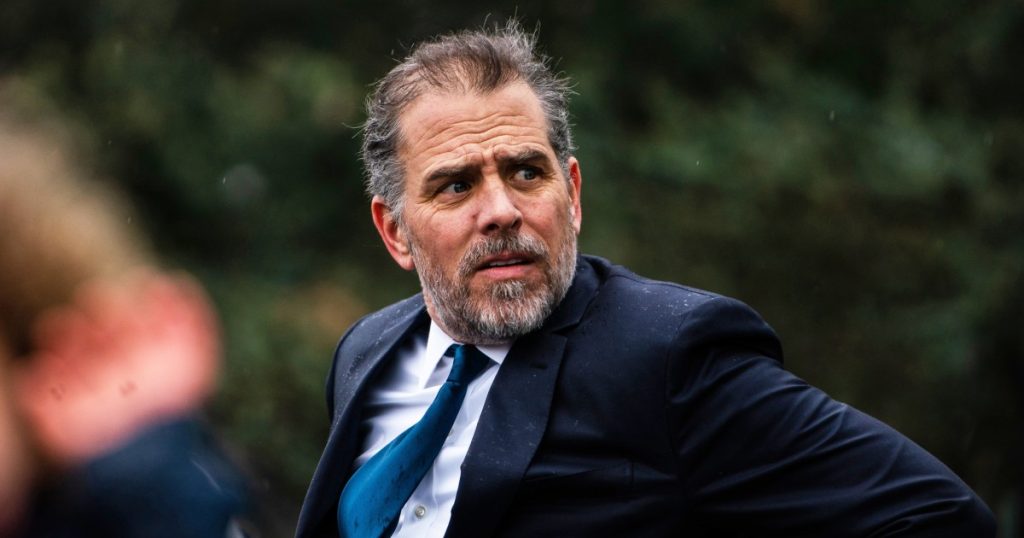

A former IRS employee told the House Oversight Committee that U.S. Attorney David Weiss sought authority to charge Hunter Biden in two federal districts with charges broader than the tax-related misdemeanors that the president’s son agreed this week to plead guilty to, according to a 212-page transcript of his interview.
The whistleblower, Gary Shapley, says that Attorney General Merrick Garland was not telling Congress the truth in earlier testimony when he asserted that Weiss, who is based in Delaware, had the ability to charge in other jurisdictions, including California and Washington, D.C. Shapley said bringing charges in those districts is not something the U.S. Attorneys there, who were appointed by President Joe Biden, would do.
The Justice Department denied the charges by Shapley.
“As both the Attorney General and U.S. Attorney David Weiss have said, U.S. Attorney Weiss has full authority over this matter, including responsibility for deciding where, when, and whether to file charges as he deems appropriate. He needs no further approval to do so,” said Wyn Hornbuckle, deputy director of the Justice Department Office of Public Affairs.
Shapley told the committee that as an investigator for the IRS, he obtained messages Hunter Biden sent on the WhatsApp platform, including one that he read demanding payment from a Chinese businessman named Henry Zhao. In that message, Hunter Biden appeared to suggest that he was sitting with his father, then the former vice president, saying, “I will make certain that between the man sitting next to me and every person he knows and my ability to forever hold a grudge that you will regret not following my direction.”
Shapley, who is a supervisory special agent with IRS criminal investigations and has worked for the agency since July 2009, testified in May and the committee made the transcript available on Thursday.
The Justice Department has insisted that Weiss, who remained the U.S. Attorney in Delaware after being appointed by former President Donald Trump, was allowed to act with independence and that no pressure was put on him to go easy on Hunter Biden.
Weiss’s office declined to comment, but pointed to his June 7th letter to the House Judiciary Committee in which he said his decisions were made independently.
“Throughout my tenure as U.S. Attorney my decisions have been made — and with respect to the matter must be made — without reference to political considerations,” Weiss wrote.
However, critics of the president have charged that he put his thumb on the scale in favor of his son and that Hunter Biden’s agreement to plead guilty to two misdemeanors and avoid jail time was a “sweetheart” deal.
In his opening statement before the Republican-controlled Oversight Committee, Shapley said, “I am alleging, with evidence, that DOJ provided preferential treatment, slow-walked the investigation, did nothing to avoid obvious conflicts of interest in this investigation.”
He added that “the investigation into Hunter Biden, code name Sportsman, was first opened in November 2018 as an offshoot of an investigation the IRS was conducting into a foreign-based amateur online pornography platform.”
Hunter Biden’s guilty plea was in connection to his 2017 and 2018 tax filings. But Shapley said he saw evidence that Hunter Biden should also have been charged in connection with his 2014 tax filing — a year that his father was vice president.
The Justice Department would have charged in “any other case I ever worked with similar fact patterns, similar acts of evasion and similar tax due and owing,” Shapley told the committee.
In the course of his interview with the House Ways and Means Committee he was shown an email — first reported on by NBC News in December — from Hunter Biden’s business associate stating that Hunter Biden needed to re-state his income on his tax returns in large part due to his Burisma payments.
Shapley said the email is important to that case, but that it was not brought because the statute of limitations was allowed to expire.
In addition, Shapley says efforts to search Biden-associated properties and a public relations firm named Blue Star Strategies were not approved. The latter, “was a significant blow to the Foreign Agents Registration Act piece of the investigation,” referring to the law which requires individuals working in the U.S. on behalf of foreign governments to register.
Shapley said he participated in the investigation of the 2018 tax filing. Court filings made in Delaware indicating that the a plea agreement is forthcoming have been sparse on detail, but Shapley testified under oath that Hunter Biden was listing personal expenses as business expenses.
“He was expensing personal expenses, his business expenses,” Shapley said. “So, I mean, everything, there was a payment that — there was a $25,000 to one of his girlfriends and it said, ‘golf membership.’ And then we went out and followed that money it was for a sex club membership in LA.”
Shapley says that travel costs to visit prostitutes were also improperly booked as business expenses.
He says that he thought it was valuable for the FBI and IRS to ask questions about the now infamous e-mail “10 for the big guy” an apparent reference to money for Joe Biden out of one of Hunter Biden’s attempted businesses with a Chinese firm.

 Latest Breaking News Online News Portal
Latest Breaking News Online News Portal




